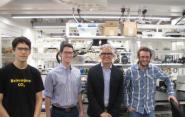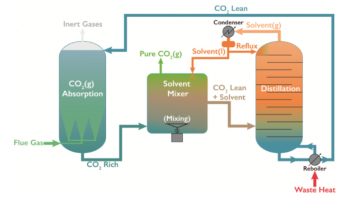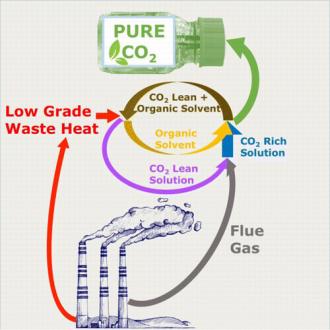Dividing Time Between High School and Lab, Student Finds Method For Carbon Capture and Advances in XPRIZE

Finding a practical way to reduce carbon dioxide (CO2) emissions from power plants is an ongoing quest among scientists. By developing a new CO2 capture and separation method, the lab of Prof. Menachem Elimelech has taken what could be a major step toward that goal and has just advanced in the Carbon XPRIZE, a four-year competition with a $20 million prize.
 Introduced in a paper recently published in Environmental Science & Technology Letters, the idea came from Ethan Novek, who made the discovery while a high school sophomore in his science research class. Through a self-study program at Greenwich High School, he’s now fulfilling the academics of his senior year while working full-time in Elimelech’s lab.
Introduced in a paper recently published in Environmental Science & Technology Letters, the idea came from Ethan Novek, who made the discovery while a high school sophomore in his science research class. Through a self-study program at Greenwich High School, he’s now fulfilling the academics of his senior year while working full-time in Elimelech’s lab.
Novek first contacted Elimelech after he developed a few inventions using low-temperature waste heat, one focus of Elimelech’s work. Novek filed provisional patents for each invention and spoke to Elimelech about further developing them. Elimelech invited him to work in the lab.
“I was delighted that it was possible for him to do so,” said Elimelech, the Roberto C. Goizueta Professor of Chemical & Environmental Engineering. “I have no doubt that his stay in my lab will be productive and successful."
Novek first worked in the lab part-time, which required him to carefully arrange his high school course schedule and travel to New Haven in the afternoon. It helped that Novek, who went into advanced placement chemistry two years early, was more than up to speed in his other subjects. But it meant giving up several school clubs and the cross country and track teams. “When I started working on this, I knew I’d have to go full force and work on this to the best of my ability, or I shouldn’t be working on it,” he said.
 After a few months of shuttling back and forth between Greenwich and New Haven, Novek figured there must be a better way. “I told my guidance counselor, ‘I’m doing all these amazing things and there’s a lot of potential here and I need more time to work on these.”
After a few months of shuttling back and forth between Greenwich and New Haven, Novek figured there must be a better way. “I told my guidance counselor, ‘I’m doing all these amazing things and there’s a lot of potential here and I need more time to work on these.”
They worked out a plan that allowed Novek to do individual study for his other subjects while working full-time in the lab. Elimelech was impressed by his dedication. "It is very rare to find anyone with such developed ideas and drive, even among our undergraduate students at Yale,” he said.
Elimelech had Novek work with graduate student Evyatar Shaulsky. Although he thought Novek had a lot of promise, Shaulsky was unsure about having him work in the lab. “In the beginning, I was very skeptical. I thought ‘Here’s another high school student who’s coming with huge ideas,’” he said, laughing. “I told Meny [Elimelech] ‘let’s let him work on one of our projects in the lab for a few months. It will be good for his resume and good for everyone. And Meny decisively said, ‘No, no, no - let him work on his ideas.’”
The collaboration proved a fruitful one and they pursued Novek’s idea for capturing CO2, based on a discovery that also won First Place at the Intel International Science and Engineering Fair (Intel ISEF), and other international awards. One promising method of CO2 reduction is capturing low concentrations of the gas and converting it to a pure form that can be used in a variety of ways. Unlike the team’s process, current technologies for doing this are very expensive.
Novek found that pure CO2 is desorbed at room temperature and pressure by adding a water-soluble organic solvent to an aqueous ammonia/carbon dioxide solution. Quantifying how much CO2 their system was generating wasn’t initially easy, though. They recruited Zachary Fishman, a Ph.D. student in the neighboring lab of Prof. Lisa Pfefferle. With Zack’s expertise in using mass spectrometry, they could continuously monitor the amount of CO2 captured.
The team’s process requires 75% less energy and 53oC lower temperatures than the current most efficient CO2 capture processes. Additionally, their novel CO2 separation mechanism runs at temperatures low enough to be powered entirely by low temperature waste heat, which makes up more than 60% of the energy generated by power plants. Currently, it is all discarded.
Fishman said the diversity of the group helped the project. “One of the interesting things for me is our age range and backgrounds are very different, so we look at problems differently,” he said. “One thing Ethan did that I wouldn’t have thought to do was he entered us into the Carbon XPRIZE.” That’s a four-year, $20 million competition to develop ways to convert CO₂ emissions into useful products. Their team, Innovator Energy, was informed Monday that it was one of six teams to be awarded semifinalist in both the coal and natural gas competition tracks. The team is now applying for additional grants to fund the building of a prototype and optimize efficiency.
Novek, who is applying to Yale for the 2017-18 year, is excited by the progress they’ve made. “It’s really important that we have effective carbon capture, and limited progress has been made in last 10 years,” he said. “This is a significant step forward.”
Team Website: http://www.innovatorenergy.com/

